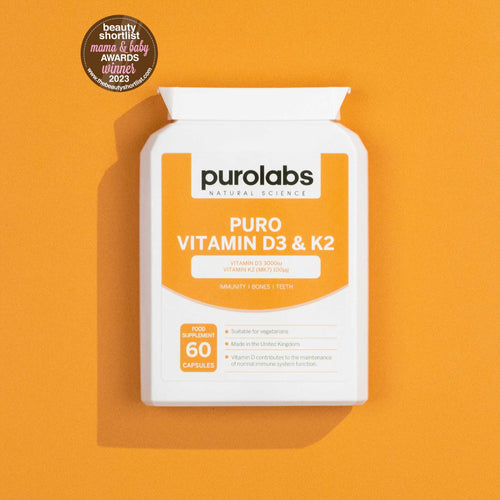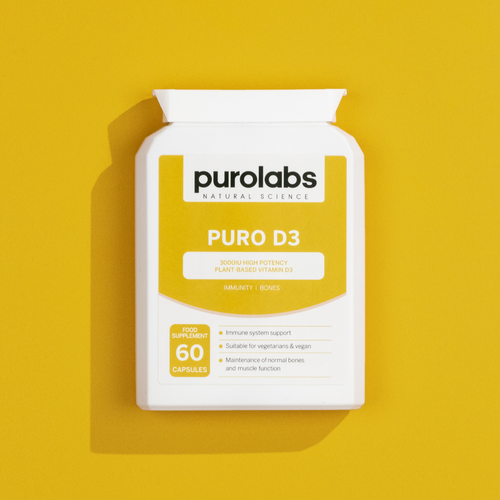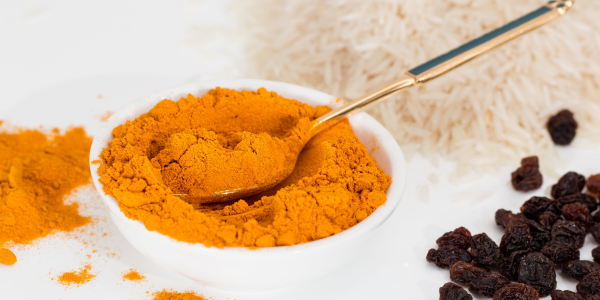Vitamin D is an essential nutrient that plays a crucial role in our overall health and well-being. Vitamin D is often referred to as the "sunshine vitamin", because our bodies produce it when our skin is exposed to sunlight. However, many people do not get enough vitamin D from sunlight alone, especially since the pandemic and the rise of remote working, and may need to supplement their intake through diet or supplements.
What is Vitamin D?
Vitamin D is a fat-soluble vitamin that is essential for maintaining strong bones, regulating the immune system, and promoting overall health. It is produced in the body when the skin is exposed to sunlight, specifically UVB rays.
There are two main forms of vitamin D: vitamin D2 (ergocalciferol) and vitamin D3 (cholecalciferol). Vitamin D2 is found in some plant-based foods, while vitamin D3 is produced in the skin and can also be found in animal-based foods.
Vitamin D benefits
Vitamin D has numerous benefits for our health, including:
- Stronger Bones: Vitamin D helps the body absorb calcium, which is essential for maintaining strong bones and preventing conditions like osteoporosis.
- Improved Immune Function: Vitamin D plays a crucial role in regulating the immune system and can help prevent infections and autoimmune diseases.
- Reduced Risk of Chronic Diseases: Studies have shown that vitamin D may help reduce the risk of chronic diseases such as heart disease, diabetes, and certain types of cancer.
- Mood Regulation: Vitamin D may play a role in regulating mood and preventing conditions like depression and anxiety.
- Improved Muscle Function: Vitamin D is important for maintaining muscle strength and may help prevent conditions like sarcopenia (age-related muscle loss).
How to Get Enough Vitamin D
Sun Exposure
The most natural way to get vitamin D is through sun exposure. When our skin is exposed to sunlight, it produces vitamin D3. However, the amount of vitamin D produced depends on factors such as time of day, season, and skin colour.
In general, it is recommended to spend 5-30 minutes in the sun, without sunscreen, at least twice a week to get enough vitamin D. However, this may vary depending on your location and skin type.
Diet
While there are not many foods that naturally contain vitamin D, some good sources include fatty fish (such as salmon and tuna), egg yolks, and fortified foods like milk and cereal. However, it can be challenging to get enough vitamin D through diet alone, especially for those who follow a plant-based diet.
Supplements
If you are not able to get enough vitamin D through sun exposure and diet, supplements can be a good option. Vitamin D supplements are available in both D2 and D3 forms and come in various strengths. It is important to consult with a healthcare professional before starting any new supplement regimen.
What is the difference between Vitamin D and Vitamin D3?
Vitamin D is a group of fat-soluble secosteroids responsible for increasing intestinal absorption of calcium, magnesium, and phosphate. Vitamin D3, also known as cholecalciferol, is one of the forms of vitamin D. It is produced in the skin when exposed to sunlight and can also be found in some animal-based foods. Vitamin D2, known as ergocalciferol, is another form found in some plant-based foods. Both D2 and D3 are important for maintaining strong bones, regulating the immune system, and overall health.
Taking Vitamin D and other supplements
When taking vitamin D supplements, it is often recommended to consider taking magnesium and vitamin K2 along with it. Magnesium helps with the absorption of vitamin D, while vitamin K2 helps ensure that calcium absorbed due to vitamin D is properly utilised in the body, supporting bone health.

Magnesium Citrate
What causes vitamin D deficiency?
Vitamin D deficiency can be caused by various factors such as inadequate sun exposure, living in regions with little sunlight, being elderly, having certain medical conditions that affect fat absorption, or following a strict vegan diet. Additionally, obesity and certain medications can also contribute to vitamin D deficiency. It's essential to be aware of these factors and consult with a healthcare professional if you suspect you may have a severe vitamin D deficiency.
Conclusion
Vitamin D is an essential nutrient that plays a crucial role in our overall health and well-being. While sun exposure and diet can provide some vitamin D, supplements may be necessary for those who are deficient. By understanding the benefits of vitamin D and how to get enough of it, you can take steps to improve your overall health and well-being.
Discover Purolabs Vitamin D supplements here:

Vitamin D3 & K2


 Beauty
Beauty
 Bone Health
Bone Health
 Brain Health
Brain Health
 Energy
Energy
 Eye Health
Eye Health
 Gut Health
Gut Health
 Hair
Hair
 Hormonal Health
Hormonal Health
 Heart Health
Heart Health
 Immunity
Immunity
 Joints
Joints
 Menopause
Menopause
 Pregnancy
Pregnancy
 Kids
Kids
 Sleep
Sleep
 Stress & Mood
Stress & Mood




















